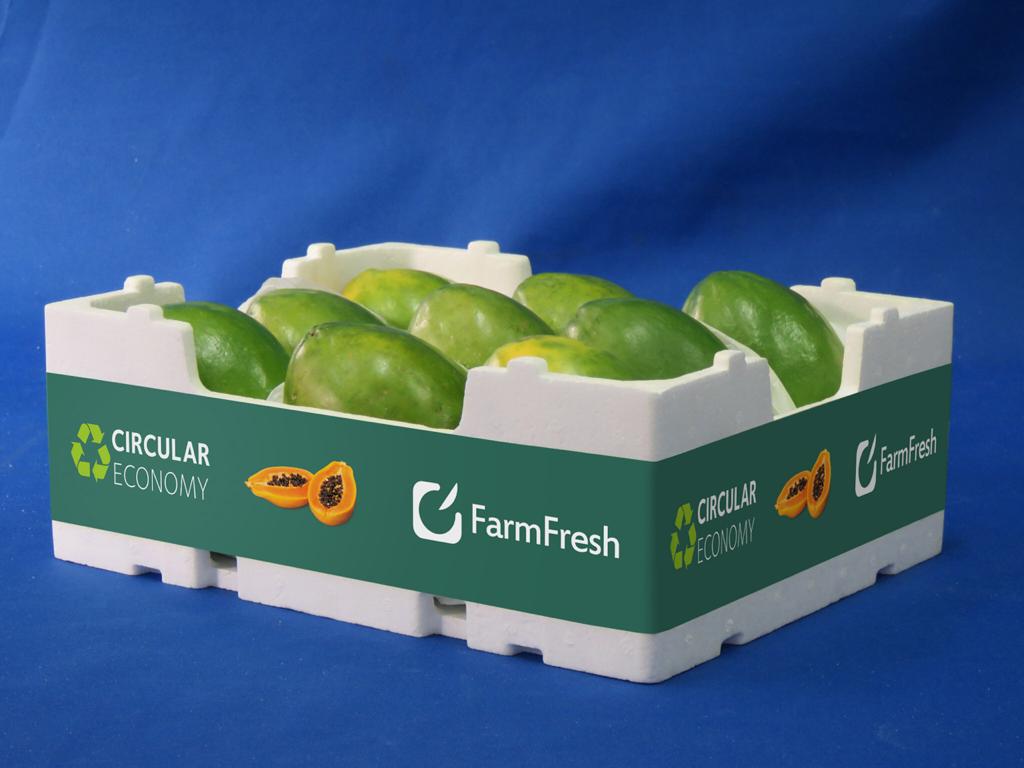Covid-19: EPS packaging increases food safety for fresh produce
With the Covid-19 pandemic, about 81% of Brazilian consumers expressed concern about food hygiene and safety according to a survey conducted in March by the PMA – Produce Marketing Association (pma.agr.br), an entity that brings together producers of Brazilian FLV (Fruits, Legumes, Vegetables) for the export market. At the same time, consuming quality fresh produce is essential to maintain good health and high immunity levels. Supermarket chains have already reported a significant increase, 40%, in the demand for these foods.
This new reality has been changing consumer behavior. According to the same PMA survey, 59% of consumers report that they’ve been looking for more packaged fresh products for safety reasons. What was previously in bulk is now being packaged for greater food safety, that’s because the packaging provides less human interaction throughout all process from production, handling, at the point-of-sale, all the way up to the consumers’ table.
Manufactured by Termotécnica (termotecnica.ind.br) and sold in the Brazilian market under the DaColheita brand, FarmFresh EPS conservers guarantee added safety in protecting, storing and transporting fresh products.
E-commerce and delivery logistics ease
As consumers change their eating and shopping habits, supermarkets and the entire supply chain, in turn, are undergoing major business changes. With the decreased frequency of consumers in physical stores, the FLV market has been growing its e-commerce market-share. And food delivery apps, like i-Food, previously dedicated to food establishments, are already making deliveries for supermarkets.
Purchased via e-commerce and sent by delivery-services, packaged fresh produce gains even more significance, ensuring that they reach the customer’s home while still maintaining quality and safety. And even purchases made online but picked-up at a point-of-sale must be already packed and ready-to-go for the customers.
As for logistical issues, FarmFresh conservers also eliminate expenses with return freight, since EPS is one-way and can be 100% recycled at the destination. This makes FarmFresh solutions sustainable and suitable for packing FLV from the farm to the table. In addition to having excellent shock absorbing properties in transport, EPS maintains freshness and improves retail display while at the same time reduces human contact with the products throughout the entire chain.
With patented technology and designs, FarmFresh EPS conservers allow high thermal insulation, impact absorption, ease in stacking, transport and product display. This also represents more days with healthy, fresher FLV on store shelves providing many advantages for the retailer.
Packaged products also gain importance since product traceability is essential both to guarantee origin and quality as well as in the delivery process.
Reduced human contact when handling food, avoiding contamination risks
In the article “Coronavirus: care in the production, processing and consumption of produce” posted on its website, Embrapa – Brazilian Agricultural Research Corporation (embrapa.br), stresses that “to date, there has been no reports that food, including fresh produce, is associated with SARS-CoV-2 transmission”. However, it warns that the steps to be followed must be carried out with rigor and responsibility, from receiving and selecting produce in the agribusiness; in processing, during packaging of processed FLV; until the product’s refrigerated transport to the points-of-sale.
EPS packaging from Termotécnica not only preserves FLV quality and prolongs their useful life, but also acts as a physical barrier that prevents hand contact with the products. Maintaining them protected throughout the process, the packaging prevents direct human contact with the fresh products until they are purchased by the consumer. As a result, contamination risk of fruits and vegetables throughout the supply chain is effectively eliminated.
Shelf-life extension of fresh produce
Another consumer behavioral change during this social isolation moment has been the decrease in frequency of visits to supermarkets and an increase in the purchase volume per visit.
EPS packaging effectively delays the ripening and aging processes, inhibits microbial decomposition and preserves the quality and nutritional value of packaged fruits and vegetables, prolonging the time in which they can be consumed. They are widely used also for long-term storage and long-distance fresh produce shipments.
This is critical at a time when FLV export cargoes, for example, are not being unloaded on schedule and left in warehouses for longer periods. Exporters and importers of fresh products are concerned that by the time the harvest reaches the customer, the quality will have deteriorated considerably, impacting its value and increasing waste.
The exclusive formulation of FarmFresh EPS conservers also demonstrated the potential to preserve the nutritional value of fresh produce after prolonged storage, maintaining its quality for longer while also avoiding food waste. Certified by tests in European laboratories (AgroTropical and HDG), FarmFresh EPS packaging can extend the shelf-life of fresh produce by up to 30%, providing benefits to all stakeholders in the FLV supply chain and helping to address these logistical issues.
More hygiene throughout the entire chain
FarmFresh EPS packaging solutions maintain the ideal atmosphere to extend FLV’s useful life and help to alleviate the consumers’ many concerns when buying fresh produce.
EPS is a totally inert material, hygroscopic (repels moisture) and washable, providing maximum hygiene levels. FarmFresh conservers can also be produced with Safe Pack, an antimicrobial raw material that reduces, by up to 99.9%, the action and presence of microorganisms, an extra protection that makes contact surfaces and products free from invisible threats of everyday life.
About Termotécnica
With a 58 year history, Termotécnica is one of Latin America’s largest EPS processing companies and one of the most sustainable companies in Brazil, according to Exame Guide 2019. With an entrepreneurial spirit, it develops solutions from Packaging & Components, Conservation, Agribusiness, Cold Chain, Cargo Handling to Building Construction materials. Headquartered in Joinville (SC), it has production and recycling units in Manaus (AM), Petrolina (PE), Rio Claro (SP), São José dos Pinhais (PR) and Pirabeiraba (SC).



